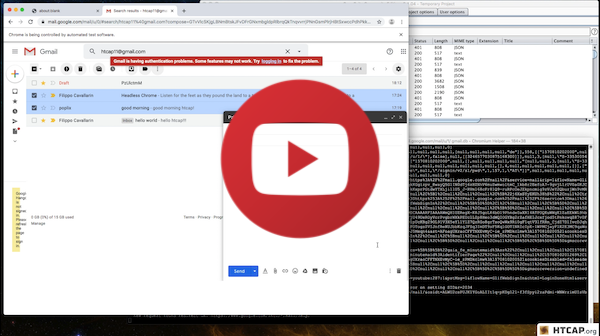https://github.com/fcavallarin/htcap
htcap is a web application scanner able to crawl single page application (SPA) recursively by intercepting ajax calls and DOM changes.
https://github.com/fcavallarin/htcap
Last synced: 7 months ago
JSON representation
htcap is a web application scanner able to crawl single page application (SPA) recursively by intercepting ajax calls and DOM changes.
- Host: GitHub
- URL: https://github.com/fcavallarin/htcap
- Owner: fcavallarin
- License: gpl-2.0
- Created: 2015-06-25T12:10:09.000Z (over 10 years ago)
- Default Branch: master
- Last Pushed: 2021-10-11T12:35:57.000Z (about 4 years ago)
- Last Synced: 2024-10-13T22:29:59.936Z (about 1 year ago)
- Language: Python
- Homepage:
- Size: 516 KB
- Stars: 611
- Watchers: 41
- Forks: 114
- Open Issues: 7
-
Metadata Files:
- Readme: README.md
Awesome Lists containing this project
- awesome-starz - fcavallarin/htcap - htcap is a web application scanner able to crawl single page application (SPA) recursively by intercepting ajax calls and DOM changes. (Python)
- awesome-hacking-lists - fcavallarin/htcap - htcap is a web application scanner able to crawl single page application (SPA) recursively by intercepting ajax calls and DOM changes. (Python)
README
## HTCAP
htcap is a web application scanner able to crawl single page application (SPA) recursively by intercepting ajax calls and DOM changes.
## KEY FEATURES
- Recursive DOM crawling engine
- Discovers ajax/fetch/jsonp/websocket requests
- Supports cookies, proxy, custom headers, http auth and more
- Heuristic page deduplication engine based on text similarities
- Scriptable login sequences
- All findings are saved to sqlite database and can be exported to an interactive html report
- The built-in fuzzers can detect SQL-Injection, XSS, Command Execution, File disclosure and many more
- Can be easly interfaced with Sqlmap, Arachni, Wapiti, Burp and many other tools
- Fuzzers are built on top of a fuzzing framework so they can be easly created/customized
- Fuzzers fully support REST and SOAP payloads (json and xml)
- Both crawler and fuzzers run in a mulithreaded environment
- The report comes with advanced filtering capabilities and workflow tools
## BRIEF
Htcap is not just another vulnerability scanner since it's focused on the crawling process and it's aimed to detect and intercept ajax/fetch calls, websockets, jsonp ecc. It uses its own fuzzers plus a set of external tools to discover vulnerabilities and it's designed to be a tool for both manual and automated penetration test of modern web applications.
It also features a small but powerful framework to quickly develop custom fuzzers with less than 60 lines of python.
The fuzzers can work with GET/POST data, XML and JSON payloads and switch between POST and GET. Of course, fuzzers run in parallel in a multi-threaded environment.
This is the very first release that uses headless chrome instead of phantomjs.
Htcap’s Javascript crawling engine has been rewritten to take advantage of the new async/await features of ecmascript and has been converted to a nodjes module build on top of [Puppetteer](https://github.com/GoogleChrome/puppeteer).
More infos [here](http://www.fcvl.net/htcap).
## DEMO
The video below shows htcap crawling gmail.
The crawl lasted for many hours and about 3000 XHR request have been captured.
[](https://www.youtube.com/watch?v=5FLmWjKE2JI "HTCAP Crawling Gmail")
## SETUP
### Requirements
1. Python 3.3
2. Nodejs and npm
3. Sqlmap (for sqlmap scanner module)
4. Arachni (for arachni scanner module)
### Local Installation
Install the requirements and run the following:
```console
$ git clone https://github.com/fcavallarin/htcap.git htcap
$ htcap/htcap.py
```
### Docker Installation
Install Docker and run the following:
```console
$ git clone https://github.com/fcavallarin/htcap.git htcap
$ cd htcap
$ docker build -t htcap --build-arg HTCAP_VERSION=master . # replace master by the desired htcap commit hash or branch
$ mkdir -p htcap-out && docker run -v "$(pwd)/htcap-out/":/out/ --rm --name htcap htcap
$ docker exec -it htcap bash
$ htcap # now you can use htcap in the Docker container
```
You can access services listening on the Docker host from within the Docker container using the hostname `host.docker.internal`.
To get the IP for `host.docker.internal`, run the following command inside the Docker container:
```console
getent hosts host.docker.internal | awk '{print $1;}'
```
## DOCUMENTATION
Documentation, examples and demos can be found [here](http://www.fcvl.net/htcap)
## LICENSE
This program is free software; you can redistribute it and/or modify it under the terms of the [GNU General Public License](https://www.gnu.org/licenses/gpl-2.0.html) as published by the Free Software Foundation; either version 2 of the License, or(at your option) any later version.